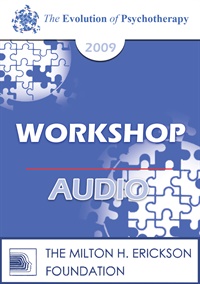EP09 Workshop 06 – Deceived: Facing Sexual Betrayal, Lies and Secrets – Claudia Black, PhD
- Average Rating:
- Not yet rated
- Topic Areas:
- Workshops | Couples Therapy | Supervision | Therapist Development | Family Therapy
- Categories:
- Evolution of Psychotherapy | Evolution of Psychotherapy 2009 | Pioneers in Couples and Family Therapy
- Faculty:
- Claudia Black, PhD
- Duration:
- 2 Hours 41 Minutes
- Format:
- Audio Only
- Original Program Date:
- Dec 09, 2009
- License:
- Never Expires.
Description
Description: This session addresses the impact of sexual betrayal and compulsive sexual behavior on partners and families. Black examines co-sex addiction, family of origin issues, and the dynamics of deception and false perceptions in relationships. Topics include early stabilization, full disclosure, boundary setting, codependency, spiritual healing, and recovery strategies.
Syllabus Description: Many women are in a couple ship riddled with deception, lies, and false perceptions as a result of her partner’s compulsive sexual acting out. Dr. Black will describe the dynamics of co-sex addiction and the role of family of origin issues in thispartnership. She will address early stabilization issues as sell as treatment and recovery issues.
Educational Objectives:
- To identify traits common to a co-addict living with sexual compulsivity.
- To describe the framework for co-sex addiction recovery.
*Sessions may be edited for content and to preserve confidentiality*
Credits
Handouts
| Timestamped Transcript (1.9 MB) | 55 Pages | Available after Purchase |
| Ericksonian Learning Snapshot (267.3 KB) | 2 Pages | Available after Purchase |
Faculty

Claudia Black, PhD Related Seminars and Products
Claudia Black, Ph.D., is internationally recognized for her pioneering and cutting-edge work with family systems and addictive disorders. Her work with children impacted by drug and alcohol addiction in the late 1970s fueled the advancement of the codependency and developmental trauma fields. Dr. Black’s passion to help young adults overcome obstacles and strengthen families built the foundation of the Claudia Black Young Adult Center. Not only is Dr. Black the clinical architect of this groundbreaking treatment program, she is also actively involved with the treatment team, patients, and their families.
Claudia is the author of It Will Never Happen To Me, Changing Course, My Dad Loves Me, My Dad Has A Disease, Repeat After Me, It's Never Too Late To Have A Happy Childhood, Relapse Toolkit, A Hole in the Sidewalk, Depression Strategies, Straight Talk, The Stamp Game, Family Strategies, Anger Strategies, Deceived: Facing Sexual Betrayal, Lies and Secrets, The Truth Begins With Youand her newest title, Intimate Treason: Healing the Trauma for Partners Confronting Sex Addiction. She has produced seven audio CDs addressing issues of addiction and recovery. They are A Time for Healing, Putting the Past Behind, Triggers, Emotional Baggage, Trauma in the Addicted Family, Imageries and Letting Go Imageries. She also has over 20 DVDs for professionals to use working with families and clients.


